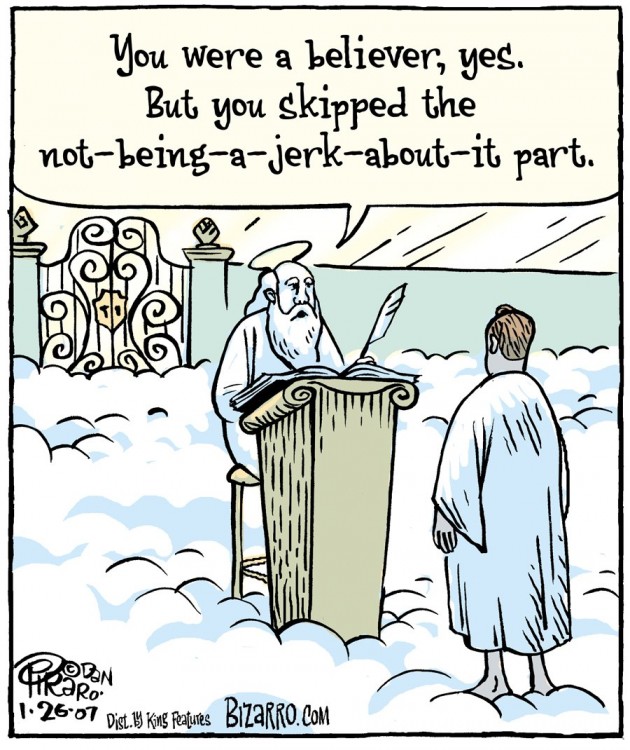Misconceptions of science and religion found in new study - See more at: http://news.rice.edu/2014/02/16/misconceptions-of-science-and-religion-found-in-new-study
The public’s view that science and religion can’t work in collaboration is a misconception that stunts progress, according to a new survey of more than 10,000 Americans, scientists and evangelical Protestants. The study by Rice University also found that scientists and the general public are surprisingly similar in their religious practices.
Elaine Howard Ecklund. Photo courtesy: Jeff Fitlow/Rice University
The study, “Religious Understandings of Science (RUS),” was conducted by sociologist Elaine Howard Ecklund and presented today in Chicago during the annual American Association for the Advancement of Science (AAAS) conference. Ecklund is the Autrey Professor of Sociology and director of Rice’s Religion and Public Life Program.
“We found that nearly 50 percent of evangelicals believe that science and religion can work together and support one another,” Ecklund said. “That’s in contrast to the fact that only 38 percent of Americans feel that science and religion can work in collaboration.”
The study also found that 18 percent of scientists attended weekly religious services, compared with 20 percent of the general U.S. population; 15 percent consider themselves very religious (versus 19 percent of the general U.S. population); 13.5 percent read religious texts weekly (compared with 17 percent of the U.S. population); and 19 percent pray several times a day (versus 26 percent of the U.S. population).
“This is a hopeful message for science policymakers and educators, because the two groups don’t have to approach religion with an attitude of combat,” Ecklund said. “Rather, they should approach it with collaboration in mind.”
Ecklund said that the way the science-religion relationship is portrayed in the news media influences the misperception.
“Most of what you see in the news are stories about these two groups at odds over the controversial issues, like teaching creationism in the schools. And the pundits and news panelists are likely the most strident representatives for each group,” she said. “It might not be as riveting for television, but consider how often you see a news story about these groups doing things for their common good. There is enormous stereotyping about this issue and not very good information.”
Ecklund noted that portions of the two groups are likely to stay put in their oppositional camps. As an example, she found that evangelical Protestants are twice as likely as the general population (11 percent) to consult a religious text or religious leader for questions about science.
Other key findings:
Nearly 60 percent of evangelical Protestants and 38 percent of all surveyed believe “scientists should be open to considering miracles in their theories or explanations.”
27 percent of Americans feel that science and religion are in conflict.
Of those who feel science and religion are in conflict, 52 percent sided with religion.
48 percent of evangelicals believe that science and religion can work in collaboration.
22 percent of scientists think most religious people are hostile to science.
Nearly 20 percent of the general population think religious people are hostile to science.
Nearly 22 percent of the general population think scientists are hostile to religion.
Nearly 36 percent of scientists have no doubt about God’s existence.
Ecklund found another counterintuitive result in the survey. The conventional wisdom is that religious people who work in science will have more doubts about their faith, but the survey revealed the opposite: Evangelical scientists practice religion more than evangelical Protestants in the general population.
“Those scientists who identify as evangelical are more religious than regular American evangelicals who are not in science,” Ecklund said.
“Evangelical scientists feel that they’ve been put under pressure or they find themselves in what they view to be more hostile environments,” she said. “They potentially see themselves as more religious, because they’re seeing the contrast between the two groups all the time.”
RUS is the largest study of American views on religion and science. It includes the nationally representative survey of more than 10,000 Americans, more than 300 in-depth interviews with Christians, Jews and Muslims — more than 140 of whom are evangelicals — and extensive observations of religious centers in Houston and Chicago.
- See more at:
http://news.rice.edu/2014/02/16/mis...gion-found-in-new-study/#sthash.mw5FGgmX.dpuf


